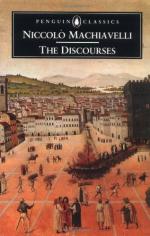|
This section contains 556 words (approx. 2 pages at 400 words per page) |

|
The Discourses Summary & Study Guide Description
The Discourses Summary & Study Guide includes comprehensive information and analysis to help you understand the book. This study guide contains the following sections:
This detailed literature summary also contains Topics for Discussion and a Free Quiz on The Discourses by Niccolò Machiavelli.
The famous fifteenth and sixteenth century Italian political philosopher Niccolo Machiavelli is widely regarded to have founded the field of political science. His best known work is The Prince, wherein Machiavelli advises princes of principalities how to rule. The term "Machiavellian" originates in Machiavelli's pragmatic advice, which seemed amoral to many. However, in the Discourses, Machiavelli is focused on the structure, nature and evolution of republics. It is much longer than The Prince and covers nearly all the major subjects of political science. Since the Discourses concerns republics, it is widely regarded as modern republican political theory's founding work.
The full title of the Discourses is Discourses on the First Ten Books of Titus Livius (or Discourses on Livy). The book purports to be a commentary on works of Roman historian Titus Livius (known as Livy), specifically those books which cover the history of the Roman Empire between the eighth and third centuries B.C.E. However, Livy's work is only a touchstone for Machiavelli's observations about the nature of political life and the laws governing it. Machiavelli often utilizes Livy's accounts of the Roman Empire to illustrate his points, but that is the main function of the text.
The Discourses is an extensive work and is divided into three volumes with different, though related, subject matters. The first book concerns the structure of a republic, discusses warfare with respect to republics and analyzes the nature of individual leadership in the republic. In the first book, Machiavelli affirms the ancient Greek view that all political societies decay systematically into their vicious counterparts, monarchies into tyrannies, democracies into anarchy, and so on. Aristotle argued that the problem could be counteracted by mixing the different forms of government.
Machiavelli agrees with Aristotle only in principle, though not with his arguments. Machiavelli conceives of the task of a political order to deal with the natural flux of the social order. Republics are intended to be lively cultures that preserve liberty and use liberty or promote the general welfare. But flux naturally gives rise to situations that threaten the integrity of republics, such as dissension, conspiracy, war, religious change, cultural change, natural disasters and the like, which inevitably lead to degeneration.
The second book concerns the growth of the Roman Empire, which Machiavelli believes was essential to the flourishing of Roman political order. Thus, Machiavelli is a kind of imperialist who thinks that conquest and government is required by many social circumstances to protect a republic's integrity, though many wars should be avoided for a number of reasons. Strong armies must always be preserved. Oddly, Machiavelli not only appeals to Roman practice but also to Roman military tactics and technology despite advances, for example, defending the use of infantry over artillery.
Book three draws eternal truths from the example of the great men of the Roman Empire. Virtuous and great leaders have a crucial function in maintaining a flourishing society. They govern the people but also have the ability to incite them to virtue and great works, not only as citizens, but as warriors. Both forms of virtue are necessary to prevent republics from being destroyed from without and decaying from within. Machiavelli expresses moderate trust in the people, often arguing that the people are wiser than princes, though leadership is required in cases of danger.
Read more from the Study Guide
|
This section contains 556 words (approx. 2 pages at 400 words per page) |

|



